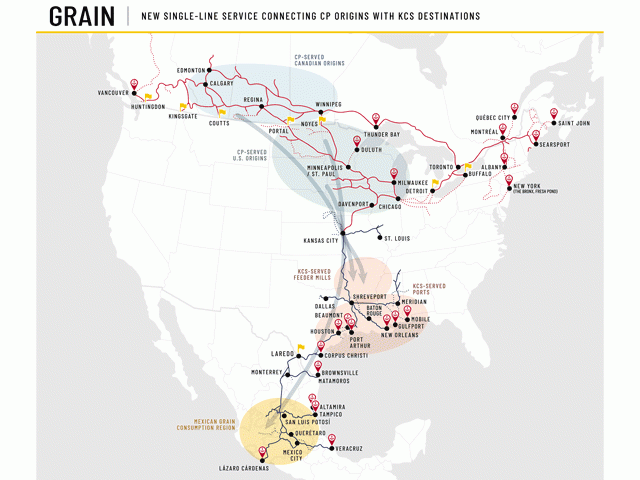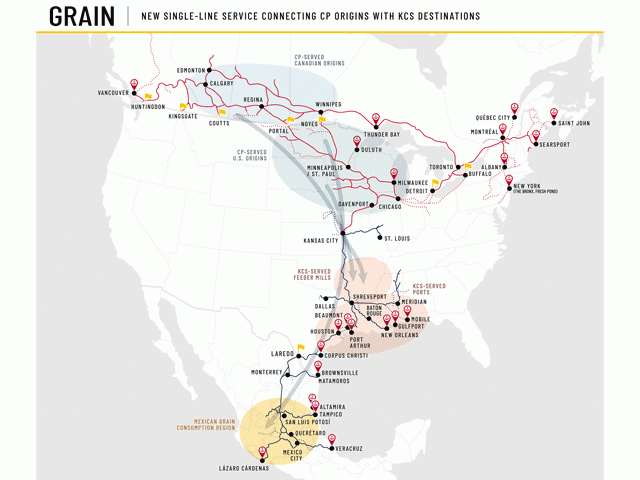Market Matters Blog
STB Approves Canadian Pacific-KC Southern Merger With Conditions
OMAHA (DTN) -- Federal regulators have conditionally approved the marriage of Canadian Pacific and Kansas City Southern railroads, a supply-chain decision that could move more grain and other commodities from Canada and the upper Midwest through new export channels into the Gulf of Mexico.
The Surface Transportation Board announced it had approved the Canadian Pacific merger with the Kansas City Southern, with certain conditions to be met going forward.
When the merger was first announced two years ago, Canadian Pacific and Kansas City Southern executives pitched the railroad as the first single rail network that would link the U.S., Canada and Mexico, much like the USMCA trade deal.
Looking at grain alone, Canadian Pacific already moves roughly 1.2 billion bushels (bb) of agricultural commodities and 1.3 billion gallons of ethanol. The merger provides the potential to move those commodities, as well as fertilizer, further south into Kansas City Southern's traditional territory as well.
In return, Kansas City Southern's network already ties into auto plants and other equipment manufacturers in Mexico, as well as port terminals in Texas down to Veracruz, Mexico, as well.
It's been a long engagement between the two railroads, but the marriage was finally approved by the Surface Transportation Board on Wednesday by a vote of four to one, while subject to certain conditions -- marking the first major railroad merger approved by the STB in two decades. The CP and KCS announced their intention to merge on March 21, 2021, then shareholders approved the $31 billion merger in December 2021, and have been waiting for STB approval since.
CP President and Chief Executive Officer Keith Creel said in a news release the benefits of the CPKC will help spur the North American economy at a time when supply chains in the three countries "have never needed it more."
Creel added. "A combined CPKC will connect North America through a unique rail network able to enhance competition, provide improved reliable rail service, take trucks off public roads and improve rail safety by expanding CP's industry-leading safety practices."
This decision includes an unprecedented seven-year oversight period and contains many conditions designed to mitigate environmental impacts, preserve competition, protect railroad workers, and promote efficient passenger rail, according to the STB. The Board also anticipates the merger will result in improvements in safety and the reduction of carbon emissions.
During the press conference held in Washington, STB Chair Marty Oberman said the issue of safety was raised a number of times, especially since the Ohio derailment last month involving Norfolk Southern. In the decision, the STB noted, "Indeed, approval of this transaction may even enhance safety for the nation as a whole" and "thus, any rail traffic diverted to CPKC from other railroads will likely mean traffic moving to a railroad with a better safety record."
P[L1] D[0x0] M[300x250] OOP[F] ADUNIT[] T[]
The STB noted in the decision that it expects this "new single-line service will foster the growth of rail traffic, shifting approximately 64,000 truckloads annually from North America's roads to rail, and will support investment in infrastructure, service quality, and safety."
"The transaction is also expected to drive employment growth across the CPKC system, adding over 800 new union-represented operating positions in the United States," the Board continued.
Another aspect of the new combined railroad is the commitment to expand passenger rail along its routes as well. Amtrak Executive Officer Stephen Gardner touted the merger.
"We believe this merger will have a significant and positive effect on Amtrak intercity passenger rail service," Gardner said.
Gardner said CP has committed to help Amtrak work with the Southern Rail Commission on two U.S. routes to link Amtrak service between New Orleans and Baton Rouge, La., as well as look at the prospect of Amtrak service between Meridian, Miss., and Dallas/Fort Worth on the new CPKC.
In the decision, the Board stated, "This transaction is 'end-to-end,' meaning that there are little to no track redundancies or overlapping routes. If consummated, it will reduce travel time for traffic moving over the single line service; it should result in increased incentives for investment; and it will eliminate the need for the two now-separate CP and KCS systems to interchange traffic moving from one system to the other. This will enhance efficiency, which in turn will enable the new CPKC system to better compete for traffic with the other larger Class I carriers."
The Board added, "There is substantial (though not unanimous) shipper support for this transaction -- the Board has received more than 450 support letters. And the other Class I railroads, in opposing the transaction, are simply seeking conditions and other remedies that appear aimed at protecting their own traffic from competition with CPKC and at limiting the ability of the combined CPKC to meet its potential. Consistent with the Board's policy to protect competition and not competitors, the Board is denying those requests while also ensuring that existing competitive gateway options are preserved."
Creel extended the company's sincere gratitude to the STB and staff for their work as part of the comprehensive review of the combination.
"This decision clearly recognizes the many benefits of this historic combination," Creel said. "As the STB found, it will stimulate new competition, create jobs, lead to new investment in our rail network, and drive economic growth.
The decision authorizes CP to exercise control of KCS as early as April 14, 2023, at or after which point CP and KCS would combine to create the new CPKC. CP said on their website they are reviewing the full 212-page decision in detail and in the coming days will announce its plans with respect to the creation of CPKC.
The STB noted on their website that while this decision is effective on April 14, 2023, petitions for reconsideration of this decision must be filed by April 4, 2023. Requests for stay must be filed by March 27, 2023. Within 60 days of today, CPKC will participate in a technical conference with Board staff to discuss compliance with reporting requirements.
Given the opposition over the merger by Illinois Senators Dick Durbin and Tammy Duckworth, along with Massachusetts Senator Elizabeth Warren and other concerned parties, it is likely the Board will hear from most, if not all, opposing parties on today's decision.
Near the end of the press conference Oberman, about moving forward with the merger, quoted baseball Hall of Fame catcher and manager, Yogi Berra saying, "It's tough to make predictions, especially about the future."
Link to the STB press release about the decision and highlighting key points/issues: https://www.stb.gov/…
Here is a link to the 212 page decision on the STB website: https://www.stb.gov/…
Any new filings concerning the decision can be found under 'Recent Filings' on the STB front page: https://www.stb.gov/…
Mary Kennedy can be reached at Mary.Kennedy@dtn.com
Follow her on Twitter @MaryCKenn
(c) Copyright 2023 DTN, LLC. All rights reserved.






Comments
To comment, please Log In or Join our Community .